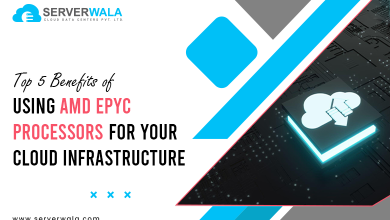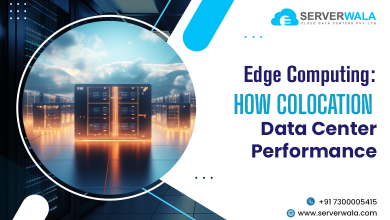The Rise of AMD EPYC in Cloud Computing: How It’s Redefining Performance Standards
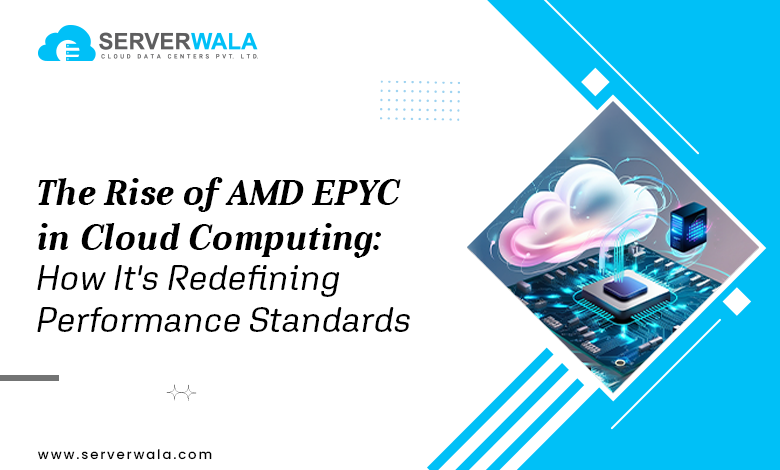
Introduction
AMD EPYC Cloud is setting new performance benchmarks in the cloud computing landscape. With its superior scalability, multi-core architecture, and energy-efficient design, it’s reshaping how cloud services deliver speed and reliability. Whether you’re looking for cost-effective solutions or unparalleled performance, AMD EPYC Cloud offers a powerful, adaptable platform for businesses of all sizes. The rise of AMD EPYC processors, especially the 3rd Gen EPYC lineup, has turned heads, thanks to its ability to handle high-compute tasks, enabling organizations to scale quickly and securely.
This blog explores the growing dominance of AMD EPYC Cloud in the cloud computing industry. It provides insights into what AMD EPYC Cloud is, highlights its key benefits, and discusses its performance compared to other processors. We’ll also explore pricing models and plans for AMD EPYC cloud servers, giving you a comprehensive understanding of why these processors are redefining performance standards in the cloud computing world.
What is AMD EPYC Cloud?
AMD EPYC Cloud refers to cloud environments powered by AMD EPYC processors, which are designed to deliver next-generation performance for a wide range of computing needs. These processors are equipped with up to 64 AMD EPYC cores, allowing them to handle massive workloads with efficiency. This capability is especially beneficial for:
- Hybrid and multi-cloud deployments: AMD EPYC Cloud optimizes resource use while keeping costs in check, making it ideal for businesses aiming to streamline operations across different cloud models.
- High-performance tasks: From data analytics to machine learning, these processors excel in managing complex computational needs without lag.
The AMD EPYC 3rd Gen processors bring significant enhancements functioning in terms of performance per watt. This means that cloud providers can offer powerful compute resources while reducing energy consumption, resulting in lower operational costs. Moreover, the energy efficiency of AMD EPYC Cloud makes it a top choice for platforms prioritizing sustainability and eco-friendly operations.
Overview of AMD EPYC in the cloud computing space
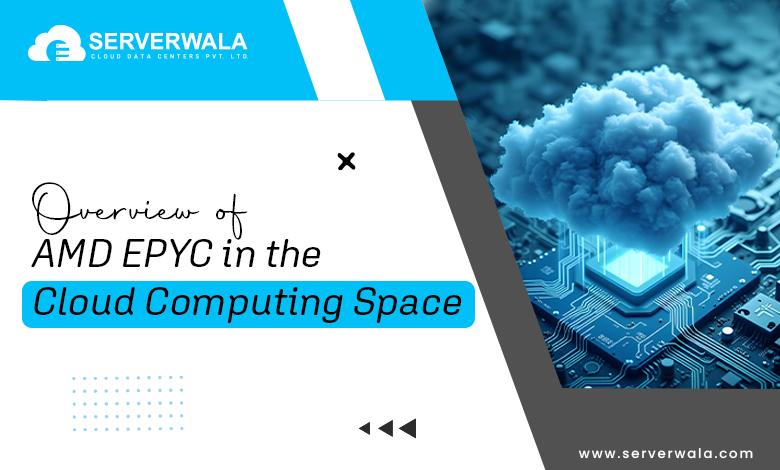
In recent years, AMD EPYC Cloud has solidified its position as a leading solution in the cloud computing space, largely due to its unmatched scalability and power efficiency. The processors, based on Zen 4 architecture, deliver remarkable performance, making them ideal for running data-intensive tasks like:
- Machine learning: The high throughput of AMD EPYC cores ensures that machine learning models can be trained quicker and with higher accuracy.
- Analytics and AI workloads: Businesses can process enormous datasets at high speeds, allowing for quicker insights and decision-making.
One of the major strengths of AMD EPYC Cloud is its enhanced virtualization capabilities, which make it perfect for cloud-native applications. This permits institutions to construct, deploy, and scale applications seamlessly across public and hybrid clouds.
Benefits of AMD EPYC Cloud
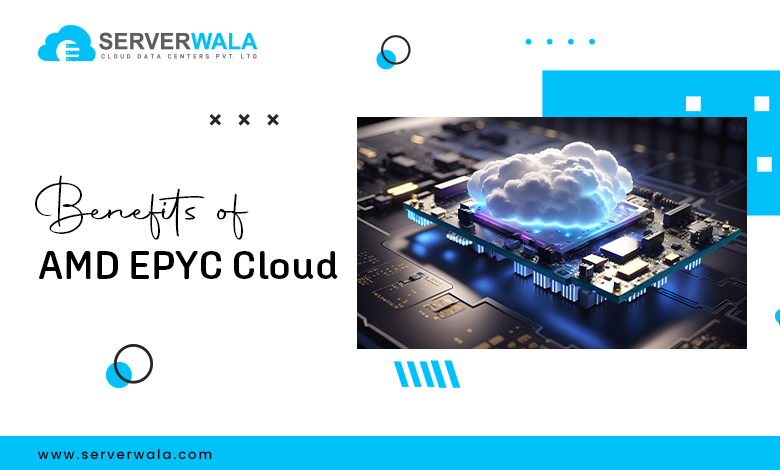
The benefits of AMD EPYC Cloud are vast and compelling:
- Superior Multi-core Performance: With up to 64 AMD EPYC cores, these processors are designed for high-performance computing (HPC) tasks. This makes them a robust option for enterprises running large databases, virtual machines (VMs), or AI applications that require massive parallel processing. The Zen 4 architecture further boosts data throughput and computational efficiency.
- Energy Efficiency: The 3rd Gen AMD EPYC processors consume less power while delivering impressive functioning. The performance-per-watt improvement reduces the overall AMD EPYC cost for cloud providers and their customers, making it an eco-friendly and cost-effective solution for scaling operations in AMD cloud computing environments.
- Security: With integrated security features such as Secure Memory Encryption (SME) and Secure Encrypted Virtualization (SEV), AMD cloud servers protect data in real-time. These features offer robust encryption at the hardware level, ensuring that both active memory and virtualized workloads are secure from breaches or tampering, making AMD EPYC hybrid clouds safer for sensitive workloads.
- Cost-Effective Scaling: Businesses can buy AMD EPYC solutions to scale their cloud services affordably without sacrificing performance. The flexible deployment models support multi-cloud and hybrid infrastructures, allowing organizations to scale on-demand while maintaining optimal performance across diverse cloud environments.
- Advanced Memory and I/O Capabilities: AMD EPYC Cloud offers leading memory bandwidth with support for up to 4TB per socket and PCIe 4.0/5.0 for ultra-fast data transfer rates. This ensures that workloads like large-scale databases, in-memory processing, and real-time analytics can run seamlessly with minimal latency.
- Optimized for Virtualization and Containerization: AMD EPYC processors are optimized for high-density virtualization and containerization, allowing cloud providers to offer more virtual machines and containers per server. This improves the overall efficiency of the AMD cloud server and maximizes hardware utilization, reducing operational costs and improving performance for hybrid cloud deployments.
Comparative analysis with other cloud computing processors
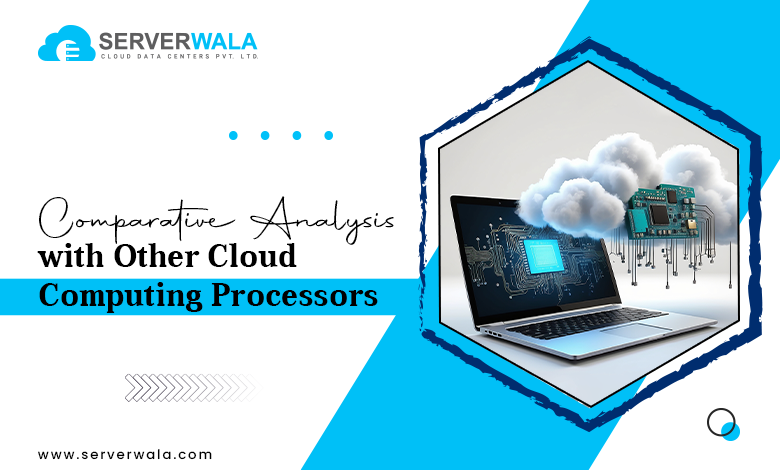
When comparing AMD EPYC Cloud with other cloud computing processors like Intel Xeon and ARM-based processors, AMD EPYC consistently stands out in several key areas:
- Performance per Watt: AMD EPYC cores offer superior performance per watt compared to Intel’s Xeon processors. This efficiency allows AMD cloud computing platforms to handle more workloads while consuming less power, which is critical in energy-conscious data centers. 3rd Gen AMD EPYC processors, built on the 7nm process, can deliver up to 25% better performance per watt than comparable Intel Xeon offerings, making them a top choice for businesses focusing on both performance and sustainability.
- Cost per Core: One of the standout advantages of AMD EPYC Cloud is its cost per core. In most scenarios, AMD EPYC cores are more affordable compared to Intel Xeon, delivering up to 64 cores per socket, while Intel tops out at 40 cores per socket in its mainstream line. This makes buying AMD EPYC more cost-effective for enterprises that need to scale their cloud infrastructure without significantly increasing costs.
- Energy Efficiency in Hybrid Cloud: AMD EPYC Cloud solutions excel in hybrid cloud environments, where energy consumption is a major concern. The 3rd Gen AMD EPYC processors feature enhanced power management technologies, which allow businesses to optimize energy use while maintaining performance. This efficiency can lead to significant reductions in operational costs, making AMD EPYC hybrid cloud deployments a practical solution for companies looking to balance cost and sustainability.
- Multi-threaded Performance: When it comes to multi-threaded applications and virtualized environments, AMD EPYC 3rd Gen processors outshine Intel Xeon. With hyper-threading and a higher core count, EPYC processors can handle a greater number of simultaneous threads, leading to faster execution times for cloud-native applications, VMs, and large-scale data analytics tasks. In benchmarks, AMD EPYC has demonstrated up to a 50% performance advantage in multi-threaded workloads over comparable Intel processors.
- Memory and I/O Support: AMD EPYC Cloud also leads in terms of memory bandwidth and I/O capacity. It supports up to 4TB of memory per socket and PCIe 4.0/5.0 standards, allowing for faster data transfer speeds and superior memory performance compared to Intel and ARM processors. This gives AMD cloud servers a significant edge in applications requiring intensive data processing, like AI, machine learning, and large-scale cloud storage.
- Security Features: While Intel Xeon offers its own security features, AMD EPYC Cloud has Secure Memory Encryption (SME) and Secure Encrypted Virtualization (SEV), which provide hardware-level encryption for both memory and virtual machines. These features ensure that data is protected in real-time, reducing the risk of attacks or data breaches, especially in sensitive hybrid cloud environments.
Plans & Pricing AMD EPYC Cloud
AMD EPYC Cloud solutions come with a range of pricing models tailored to meet different business needs, providing flexibility and affordability. One of the most common options is the pay-as-you-go model, which allows businesses to only pay for the resources they use. This is ideal for companies with variable workloads, as it renders a viable way to administer cloud computing expenses. For those with more predictable workloads, reserved instances offer significant discounts when committing to longer-term use, making it a popular choice among enterprises aiming to optimize AMD EPYC cost over time.
Many cloud providers, including Serverwala, offer some of the best plans when it comes to AMD EPYC Cloud Servers. Their offerings cater to businesses looking for flexible options, with competitive pricing models that range from hourly billing to annual subscriptions. Serverwala’s plans also include hybrid cloud deployments, where businesses can combine the power of AMD EPYC hybrid solutions with traditional infrastructure, ensuring a balance between cost-efficiency and performance.
For businesses seeking to buy AMD EPYC solutions directly, there are custom pricing options that allow enterprises to deploy AMD cloud servers either on-premise or in a hybrid cloud setup. This flexibility permits organizations to sustain administration over their resources while benefiting from the superior performance of AMD EPYC cores. Compared to their Intel Xeon counterparts, AMD EPYC processors typically offer more value for workloads that require high computational power, thanks to their cost-per-core advantage and better energy efficiency.
Serverwala’s most competitive pricing options, especially for AMD EPYC 3rd Gen solutions, start at highly affordable rates, ensuring that businesses of all sizes can benefit from the superior performance and scalability of AMD EPYC Cloud without breaking their budgets. These plans are particularly appealing for organizations that run high-performance workloads like machine learning, big data analytics, or AI-driven applications.
In summary, the combination of flexible pricing models, superior multi-core performance, and energy-efficient designs makes AMD EPYC Cloud one of the most cost-effective solutions available today. Whether you choose pay-as-you-go, reserved instances, or buying AMD EPYC hardware directly for hybrid setups, Serverwala offers some of the most attractive and competitive pricing options on the market.
Conclusion
The rise of AMD EPYC Cloud is transforming how cloud computing operates, offering better performance, enhanced security, and cost-efficiency. Its ability to handle complex workloads while minimizing energy consumption makes it a revolution maker in the industry. As organizations continue to adopt hybrid cloud and multi-cloud strategies, AMD EPYC processors will remain at the forefront of this evolution, setting new standards in cloud performance. If you’re looking to future-proof your infrastructure, buying AMD EPYC could be the strategic move to ensure you’re ready for the demands of tomorrow.




